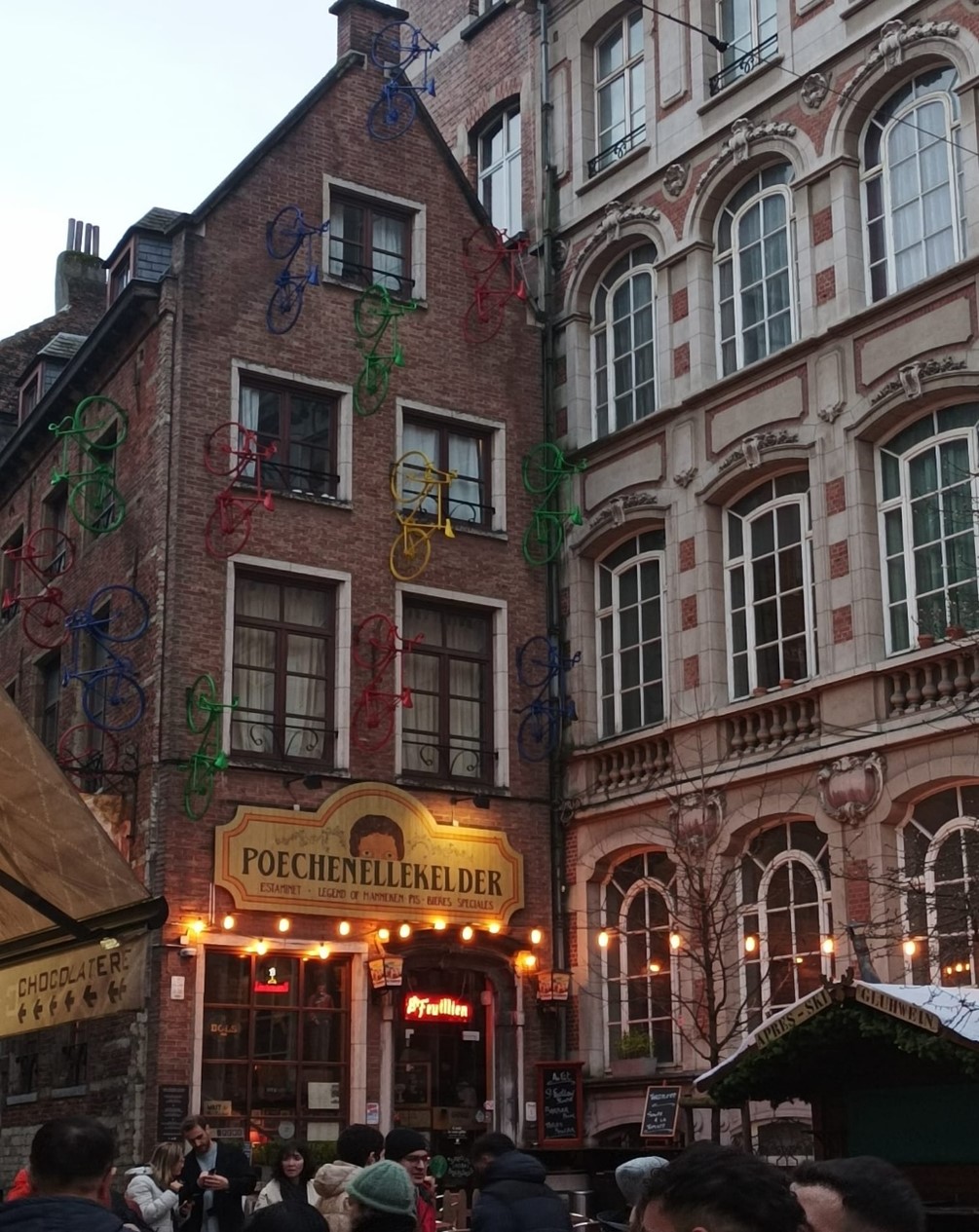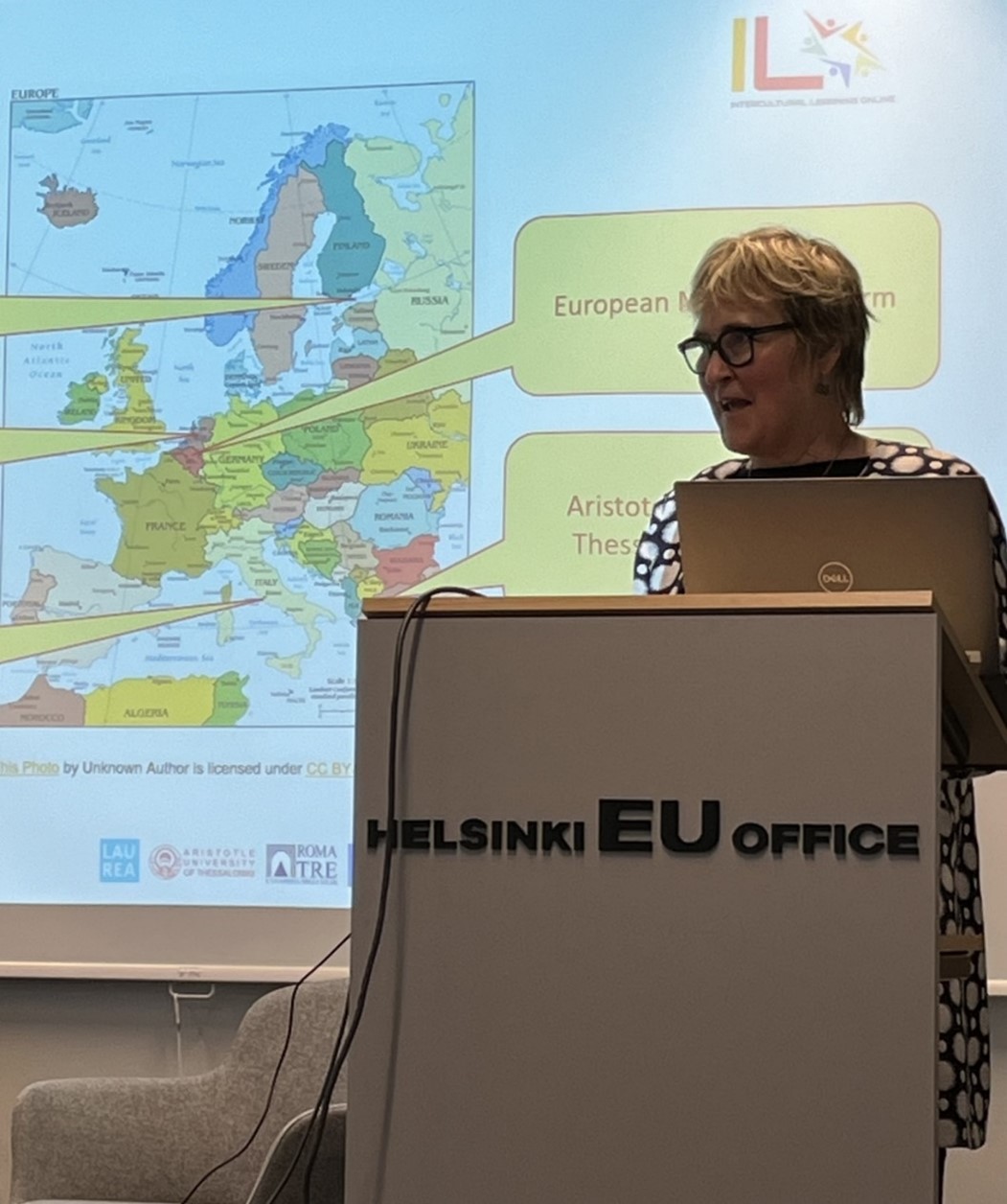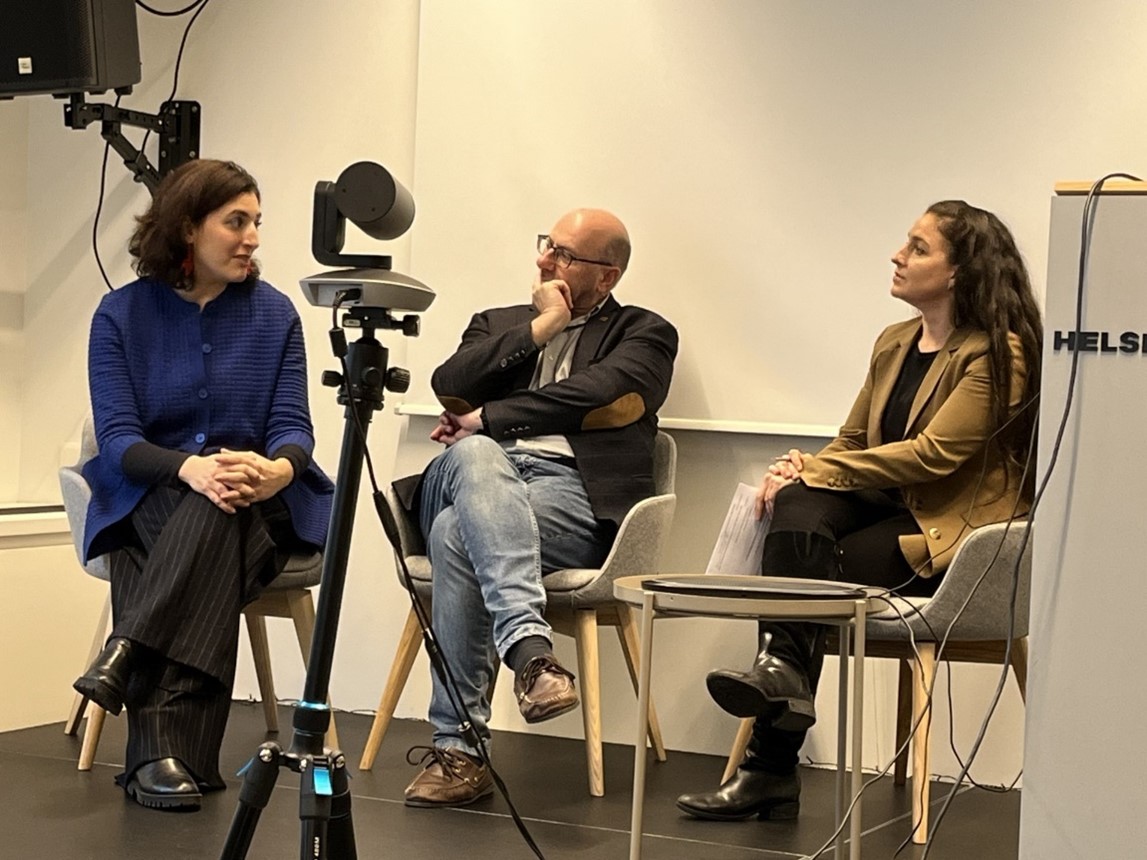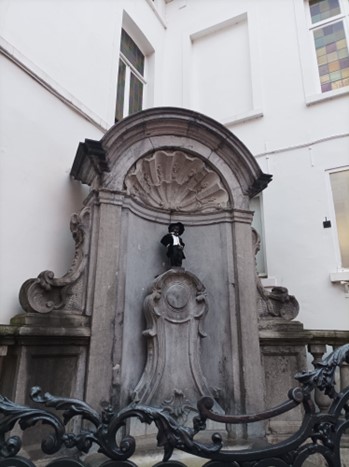In the hybrid seminars, where onsite and online seamlessly converge, the question arises: How does one successfully implement such an event? Whether you are well-acquainted with the event or navigating uncharted territory, the challenges persist in creating an experience that resonates with both physical and virtual audiences. I have previously organized a hybrid seminar with a colleague. However, at that time, we were on our campus and received technical support from the university’s lobby services at the campus facility coordinator. This experience was extremely beneficial for the successful implementation of this final seminar. Discover more about our hybrid seminar, exploring the considerations we took in moderating the event. Dive into an experience that not only caters to diverse audiences but also amplifies the impact and visibility of your project outcomes.
Crafting Global Connections: Insights from the ’Intercultural Learning Online’ Final Seminar
A unique experience to be part of the international project ’Intercultural Learning Online’- The final seminar in Brussels, Belgium, which was implemented as a hybrid event on the Zoom platform at the Helsinki EU Office. The hybrid event enables remote participation. Implemented in this way, we received participants from all over the world. The importance of planning cannot be overemphasized. Attention must be paid equally to those in person and those who participate online. The event should be planned for two different audiences. This calls for an adequate number of individuals to ensure that every participant is not only heard but also actively visible in their engagement.
 Views Brussels downtown. Photo by Johanna Saastamoinen. CC BY-SA 4.0.
Views Brussels downtown. Photo by Johanna Saastamoinen. CC BY-SA 4.0.
The Objectives and Partnerships of the ’Intercultural Learning Online’ Project
The objective of the ’Intercultural Learning Online’ project, scheduled from January 15, 2022, to March 14, 2024, is to foster intercultural understanding and establish a Europe-wide network where higher education institutions collaborate with Migrant NGOs. The project aims to provide opportunities for highly educated migrants to share their talents and expertise, while also promoting the self-esteem of migrant students through the provision of role models. Laurea University of Applied Sciences collaborates with partners such as the European Migrant Platform, Universiteit Maastricht, Università Degli Studi Roma Tre, and Aristotelio Panepistimio Thessalonikis University in this initiative. I contribute as a member of the Laurea team to the successful implementation of the project.
Highlights from the ’Intercultural Learning Online’ Final Seminar in Brussels
Throughout the project, each partner, undertook a diverse array of activities, encompassing online lectures, shared online courses (MOOCs), workshops, and videos. Additionally, online workshops were conducted, involving both migrants and students, along with the establishment of peer support and mentoring groups. Within this context, my role in the project involved organizing online guest lectures, integrating expertise seamlessly into the curriculum and collaborating with a colleague to successfully implement a peer support group specifically tailored for immigrant students.
The culmination of project activities was presented at the final seminar held on January 25, 2024, in Brussels, Belgium, where the universities shared their experiences, project results, and valuable feedback received. The participants expressed keen interest in the project results. The schedule and program were well planned with careful consideration given to each role in advance. According to the program, presentation materials were prepared and organized in advance, ensuring a seamless and efficient distribution process for quick and easy access. The objective was to create a versatile program to engage and activate participants. Beyond presenting project results, the program also prioritized introducing fresh perspectives and fostering collaborative brainstorming with the participants. With a more detailed concept planning of the event, the goals, customer promises, and customer journey comes into focus, enhancing the potential for a successful customer experience (Lassila & Birkle 2023).
After Project Manager Minttu Räty’s opening words, Rosa Kotoaro (Senior Advisor at EU Affairs) started with a speech, where she delved into the contents of the EU Skills and Talent Mobility Package, and highlighted the future goals related to learner mobility. Keynote speaker Fatih Yilmaz (Director of the projects and partnerships at Beyond the Horizon ISSG) gave a speech on the importance of sustainable solutions in projects dealing with migration and integration topics.
Fostering Intercultural Understanding in Higher Education: Challenges, Opportunities, and Integration Strategies
The final seminar program proceeded from the keynote speaker to a panel discussion, where experts and members of the ILO project partner universities Melissa Siegel (University of Maastricht), Ioammis Papageorgiou (Aristotle University of Thessaloniki), and Ilaria Boiano (Roma Tre University and Differenza Donna NGO) shared their insights and discussed how to promote intercultural understanding in higher education. The panel addressed questions such as the obstacles and possibilities in utilizing the potential of highly educated immigrants, and how institutions and organizations can enhance the integration of highly educated immigrants into professional and academic communities. Finally, the panel reflected on successful experiences in intercultural cooperation, exploring how the lessons learned from positive collaborations can be applied or adapted.
The Vital Role of Moderators in Hybrid Events
The Event moderator enhances the overall sense of presence and sustains participant interest throughout the entire event. The moderator’s responsibilities extend to maintaining the performers’ sense of security while actively contributing to the creation of an atmosphere with trust and confidence (Lassila, Marttila & Birkle 2023). In a hybrid event, a dedicated online moderator is essential. I was moderating Zoom and ensuring that the online audience atmosphere was similar to that of the attendees present in person. The moderator is responsible for providing information to participants, overseeing requests to speak, and promptly addressing any messages presented. Effectively sharing presentation materials demands technical expertise, and a successful performance necessitates an individual to ensure presentation for both in-person and online attendees. Adherence to the schedule relies on timely communication with the performers.
 Opening words by Project Manager Minttu Räty. Photo By Johanna Saastamoinen. CC BY-SA 4.0.
Opening words by Project Manager Minttu Räty. Photo By Johanna Saastamoinen. CC BY-SA 4.0.
Technical Considerations and Insights of Implementing Hybrid Panel Discussions
Implementing a panel discussion as a hybrid requires good sound reproduction and video to convey the same atmosphere to those online. At the Helsinki EU office, employees supported technical solutions to ensure the success of the seminar. Sufficient time and practice should be reserved before the event starts to avoid technical problems. Testing of connections and equipment is essential to ensure a smooth start to the event. I made sure that we had sufficient time to familiarize ourselves with the event venue and technical solutions.
 Hybrid Panel Discussions. Photo By Johanna Saastamoinen. CC BY-SA 4.0.
Hybrid Panel Discussions. Photo By Johanna Saastamoinen. CC BY-SA 4.0.
Empowering Participants through the Learning Café Method
The Learning Café method significantly enhanced participants’ online interaction, providing an inclusive platform for individuals to share, influence, and present their thoughts and ideas. We divided the participants on Zoom into breakout rooms, each with a moderator to facilitate discussions. We utilized the same platform for the attendees present in person. The outcomes were documented by moderators on the Padlet platform, where valuable input for further development was curated from decision-makers, universities, migrant organizations, and the individual perspectives of migrants. Using the same platform for both online and in-person participants enabled real-time collaborative discussion. In my opinion, this promoted a sense of participant engagement and influence, both online and in person. To succeed, this required moderators both online and in person. After collaborative work, we briefly summarized participants’ thoughts and ideas.
Impact of Multidisciplinary Cooperation and Hybrid Events
I was excited about the opportunity to join an international project and gladly accepted the challenge. Throughout the project, I have learned a tremendous amount, and I attribute this to the fantastic Laurea team and all the project partners, who are rich in expertise and experience. I also had the unique chance to participate in an event held abroad, adding to my experience in organizing hybrid seminars. I am grateful for the valuable experience I gained.
 The final seminar provided an opportunity to explore Brussels attractions such as Manneken Pis, symbolizing freedom for the Belgians. Photo by Johanna Saastamoinen. CC BY-SA 4.0
The final seminar provided an opportunity to explore Brussels attractions such as Manneken Pis, symbolizing freedom for the Belgians. Photo by Johanna Saastamoinen. CC BY-SA 4.0
The project enabled networking, encounters with amazing people in striving to change the world, and attitudes, building and innovating something new towards permanent solutions. Internationality, multiculturalism, and the reduction of inequalities – to influence society, education, and individuals. Multidisciplinary cooperation with universities has produced the desired results and has attracted interest both nationally and internationally. The hybrid event also enables wide visibility to the general audience.
References